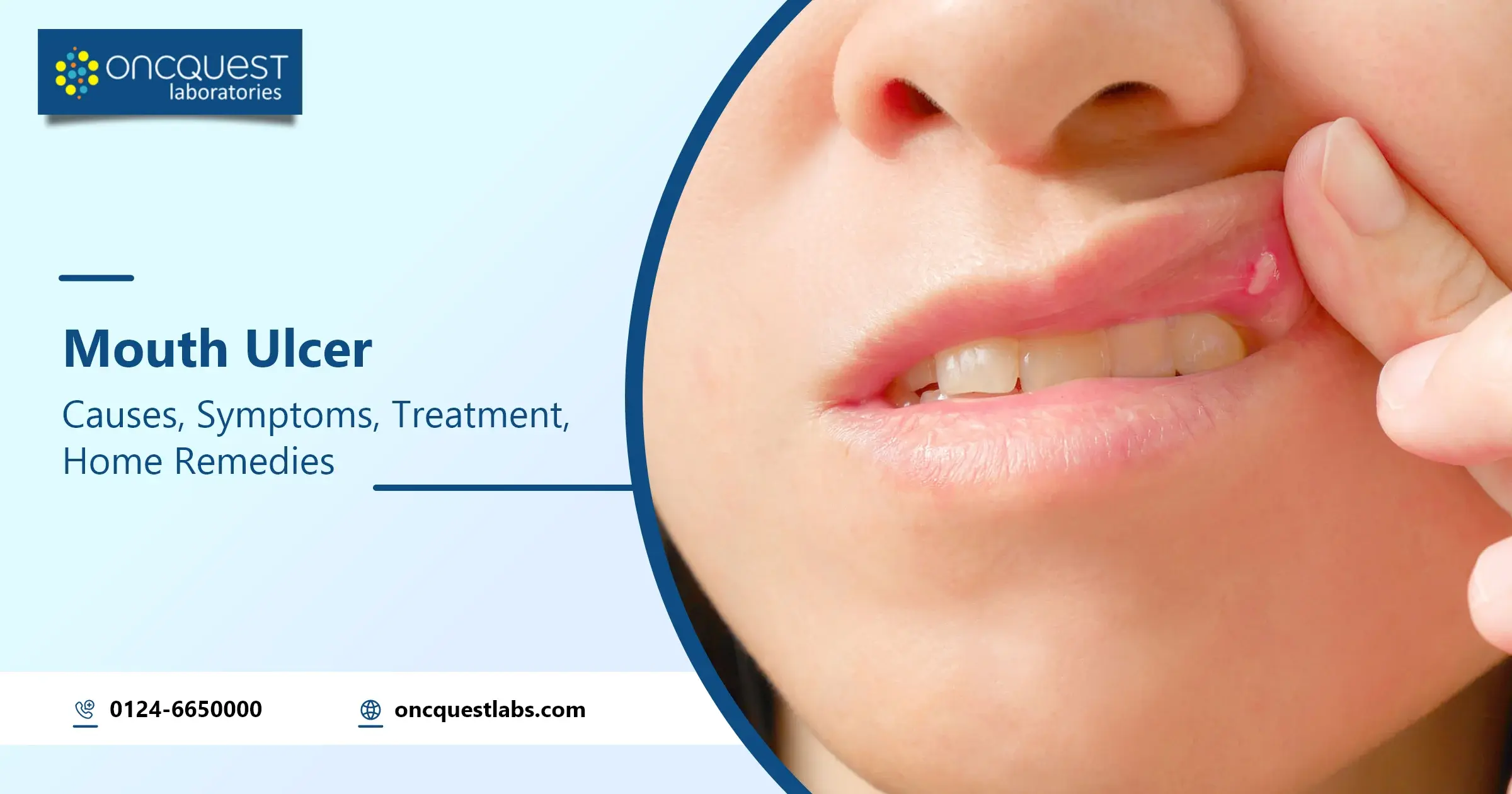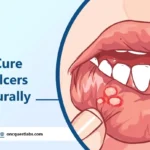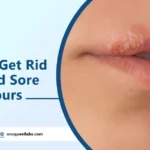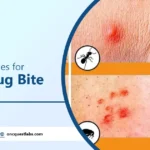Hey pals! Ever had a tiny boo•boo inside your mouth that just won’t quit? That’s a mouth ulcer, and they’re no fun! But don’t worry, we’ve got your back. In this quick guide, we’re spilling the beans on why these cheeky sores pop up, what they feel like, and the cool tricks to make them vanish. No confusing stuff, just easy peasy info! So, let’s chat about those annoying mouth ulcers and learn how to send them packing!
Contents
What is Mouth Ulcer?
A mouth ulcer is like a tiny sore or wound that shows up inside your mouth. It’s that annoying thing that can make eating or talking a bit uncomfortable. These little sores can be white or yellowish and might hang around for a short or longer time. They’re not contagious, so you won’t pass them on like a cold. Sometimes, they pop up for reasons like stress, munching on certain foods, or even a bit of mouth injury. The good news is, they usually go away on their own, and there are tricks to ease the discomfort!
Types of Mouth Ulcers
There are a few types of mouth ulcers, each with its own quirks:
1. Cancer Sores:
• Small, round, and with a white or yellowish center.
• Often surrounded by a red border.
• Can pop up inside your cheeks, lips, or under your tongue.
2. Cold Sores:
• Also called fever blisters.
• Typically show up outside the mouth, like on the lips.
• It Contains fluid and might be a bit painful.
3. Oral Thrush:
• Caused by a fungal infection (yeast).
• Shows up as creamy white lesions on the tongue and inner cheeks.
• More common in babies, older adults, and those with weakened immune systems.
These are the main players in the world of mouth ulcers!
Causes of Mouth Ulcers
Mouth ulcers can be a bit mysterious, but a few usual suspects might be behind them:
1. Genetic Factors:
• Sometimes, it runs in the family. Thanks, genes!
2. Dietary Deficiencies:
• Not getting enough vitamins like B12, iron, or folate.
3. Stress and Hormonal Changes:
• Life getting a bit too hectic? Stress might be the culprit.
4. Trauma or Injury:
• Accidentally biting your cheek or brushing too hard.
5. Infections:
• Viruses or bacteria deciding to party in your mouth.
Understanding these causes can help in preventing those pesky mouth ulcers.
Symptoms of Mouth Ulcers
Spotting a mouth ulcer is like finding a tiny troublemaker in your mouth. Here are the signs:
1. Pain and Discomfort:
• That sore spot can be a bit tender and make chewing or talking a hassle.
2. Redness and Inflammation:
• The area around the ulcer might get a bit red and puffy.
3. White or Yellowish Sores:
• The ulcer itself can be a small, roundish thing with a white or yellowish center.
4. Difficulty in Eating or Talking:
• If it’s in a tricky spot, you might feel a bit restricted in munching or chatting.
Keep an eye out for these signals, and you’ll be a mouth ulcer detective in no time!
Diagnosis
Diagnosing mouth ulcers is usually straightforward, and a visit to your healthcare provider can help confirm what’s going on. Here’s how they might figure it out:
1. Medical Examination:
• Your doctor will likely ask about your symptoms and examine your mouth to see the ulcer’s size, location, and appearance.
2. Laboratory Tests (if necessary):
• In some cases, especially if the ulcers are severe or recurrent, your healthcare provider might suggest additional tests to rule out underlying conditions or infections.
Remember, if you’re unsure or if the ulcers persist, it’s always a good idea to seek professional advice!
Treatment Options
Treating mouth ulcers often involves a mix of over•the•counter remedies and, in some cases, prescription medications. Here are some options:
1. Over-the-Counter Topical Medications:
• Gels or ointments that you apply directly on the ulcer to ease pain and promote healing.
2. Prescription Medications:
• For severe cases, your doctor might prescribe stronger medications like corticosteroids to reduce inflammation.
3. Antimicrobial Mouthwashes:
• Rinses designed to keep the area clean and prevent infection.
4. Oral Corticosteroids (for severe cases):
• Prescribed for larger or persistent ulcers to help with inflammation.
The right treatment depends on the type and severity of your mouth ulcer, so it’s always a good idea to check in with a healthcare pro!
Home Remedies for Mouth Ulcers
Absolutely! Here are some detailed home remedies to soothe those pesky mouth ulcers:
1. Saltwater Rinses:
• Mix a teaspoon of salt in a glass of warm water.
• Gargle with this solution several times a day to help reduce inflammation and promote healing.
2. Honey:
• Apply a small amount of honey directly onto the ulcer.
• Honey’s natural properties can aid in healing and provide relief.
3. Coconut Oil:
• Dab a bit of coconut oil onto the ulcer.
• Known for its antimicrobial properties, coconut oil can help prevent infection and ease discomfort.
4. Aloe Vera Gel:
• Apply a small amount of aloe vera gel directly to the ulcer.
• Aloe vera has soothing properties that can promote healing.
5. Avoiding Spicy or Acidic Foods:
• Skip the hot sauce and acidic foods that might irritate the ulcer.
6. Maintaining Good Oral Hygiene:
• Brush gently and use a soft•bristled toothbrush to avoid aggravating the ulcer.
Remember, these remedies can vary in effectiveness for different people, so it’s a bit of trial and error. If the ulcer persists or worsens, consulting a healthcare professional is a good next step!
Prevention Strategies
Preventing mouth ulcers involves a mix of lifestyle habits and self•care. Here are some strategies to keep those pesky sores at bay:
1. Balanced Diet and Nutritional Supplements:
• Ensure you’re getting enough vitamins and minerals, especially B12, iron, and folate.
2. Stress Management Techniques:
• Practice relaxation methods like deep breathing or yoga to keep stress levels in check.
3. Avoiding Triggers:
• Identify and steer clear of foods that may trigger mouth ulcers, such as spicy or acidic items.
4. Good Oral Hygiene:
• Brush and floss regularly to maintain a healthy mouth and prevent infections.
5. Stay Hydrated:
• Drink plenty of water to keep your mouth and body well•hydrated.
6. Regular Dental Check-ups:
• Visit your dentist for regular check•ups to catch any oral issues early.
These simple steps can go a long way in keeping those mouth ulcers from making unwelcome appearances!
When to Seek Professional Help
Knowing when to seek professional help for mouth ulcers is crucial. Here are signs that it’s time to reach out to a healthcare professional:
1. Persistent or Recurrent Ulcers:
• If the ulcers keep coming back or stick around for an unusually long time.
2. Severe Pain:
• If the pain is intense and not easing with over•the•counter remedies.
3. Difficulty in Eating:
• If the ulcers are making it challenging to eat or drink.
4. Signs of Infection:
• If you notice signs of infection like increased redness, swelling, or the presence of pus.
5. Unsure Diagnosis:
• If you’re not sure whether it’s a mouth ulcer or something else.
Your healthcare provider can provide a proper diagnosis and recommend the most effective treatment based on your specific situation. Don’t hesitate to seek help when needed!
Conclusion
In conclusion, dealing with mouth ulcers may be a bit bothersome, but armed with the right knowledge, you can tackle them like a pro. Remember, these little sores often show up due to various reasons like stress, diet, or even genetics.
From saltwater rinses to honey and coconut oil, there are simple home remedies to ease the discomfort. Maintaining a balanced diet, managing stress, and good oral hygiene also play key roles in prevention.
However, if mouth ulcers become persistent, painful, or show signs of infection, it’s wise to seek professional help. Your healthcare provider can provide the right diagnosis and guide you toward effective treatment. So, here’s to a happy, ulcer•free smile!
Frequently asked Questions
Q1: What is the fastest way to cure mouth ulcers at home?
A1: Rinsing your mouth with saltwater or applying a mixture of honey and turmeric can help speed up the healing of mouth ulcers at home.
Q2: What is good treatment for mouth ulcers?
A2: Over-the-counter topical gels containing benzocaine or choline salicylate can provide relief, while maintaining good oral hygiene and avoiding spicy or acidic foods promotes healing of mouth ulcers.
Q3: What drinks cure mouth ulcers?
A3: Gentle, non-acidic beverages like chamomile tea, cold milk, or coconut water can help soothe mouth ulcers. Avoiding acidic and citrus drinks is advisable to prevent irritation.





